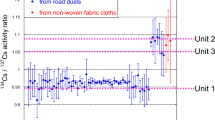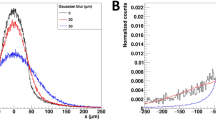Abstract
IN a letter to NATURE under this heading (Sept. 22, 1923, p. 435), Messrs. L. F. Bates and J. S. Rogers announce that they have found a certain number of long-range-particles and also of H-particles to be discharged from radium C. For every ten millions of the ordinary-particles of 7 cm. range they claim to have found the following numbers of long-range-particles: 380 of 9.3 cm., 126 of 11.1 cm., and 65 of 13.2 cm., besides 160 particles of still greater range, assumed to be H-particles. In a more detailed report of their experiments (Proc. Roy. Soc. A, vol. 105, p. 97, 1924) the latter number is stated to include also H-particles expelled from the air and the mica traversed by the ordinary-particles. Similar particles of different ranges exceeding those of the ordinary particles are stated to come also from thorium C, from actinium C, and, according to a second letter to NATURE (Dec. 29, 1923, p. 938), also from polonium.
This is a preview of subscription content, access via your institution
Access options
Subscribe to this journal
Receive 51 print issues and online access
$199.00 per year
only $3.90 per issue
Buy this article
- Purchase on Springer Link
- Instant access to full article PDF
Prices may be subject to local taxes which are calculated during checkout
Similar content being viewed by others
Author information
Authors and Affiliations
Rights and permissions
About this article
Cite this article
PETTERSSON, D. Long-range Particles from Radium-active Deposit. Nature 113, 641–642 (1924). https://doi.org/10.1038/113641b0
Issue Date:
DOI: https://doi.org/10.1038/113641b0
Comments
By submitting a comment you agree to abide by our Terms and Community Guidelines. If you find something abusive or that does not comply with our terms or guidelines please flag it as inappropriate.



